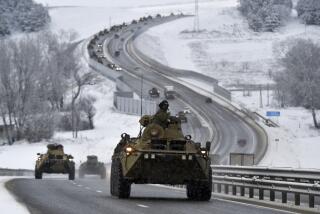Iraq Inspections a Must : U.S. should face its policy failure and work out a plan to revive international monitoring.
- Share via
Three goals have defined U.S. policy on Iraq since the end of the Persian Gulf War in 1991: to contain it militarily, to deny it weapons of mass destruction and to encourage the overthrow of Saddam Hussein. Only the first of these has been achieved.
Despite the damage to Iraqi society by economic sanctions, despite the destruction of more Scud missiles, chemical and biological warheads and secret weapons facilities than were destroyed in the Gulf War, Iraq apparently is still capable of producing unconventional weapons and Hussein’s grip on power has not slackened. It’s time to consider a new policy.
The no-fly zones patrolled by U.S. and British aircraft over northern and southern Iraq and the almost daily attacks since last December on Iraq’s air defense sites have held Hussein’s aggressive instincts in check. But in the face of increasing Iraqi obstruction, UNSCOM, the U.N. arms monitoring program, ceased functioning nine months ago. Meanwhile, economic sanctions have taken a fearful toll, not on Hussein and his cosseted military and police forces but on the Iraqi people. Hundreds of thousands of deaths, especially of children, have been blamed on a lack of imported food and medicine that has been only partly relieved by letting Iraq resume some oil sales. Hussein has been unmoved by this suffering but has sought with some success to manipulate the compassion of others. International support for Washington’s determination to hold to a tough sanctions policy has steadily eroded.
The U.N. Security Council will soon try to decide whether UNSCOM can be revived and an effective arms monitoring program restored in Iraq. Whatever might be agreed--and substantial differences separate the Russian, Chinese and French positions from those of the United States and Britain--the final word will rest with Saddam Hussein.
To try to win his agreement, the United States should offer to alter its policy of the last eight years. If Iraq agrees to readmit U.N. inspectors and allow on-the-ground monitoring that might again put its covert weapons programs at risk of detection and destruction, Washington would support a sweeping suspension of sanctions, allowing unlimited sales of Iraqi oil and the resumption of most imports except military equipment and dual-use technology.
There’s a clear political risk to this approach. Some would denounce it as appeasement of Hussein, who, if he accepted the deal, could be depended on to boast that his defiance of Washington carried the day. Some Iraqis would be impressed. So would many others in the Arab world, where official as well as popular sympathy for Iraq has been growing.
The offset is that Iraq’s programs to build weapons of mass destruction--its greatest threat to regional security--would again be opened up to international monitoring. For the United States, the painful fact to be faced is that sanctions haven’t achieved what it sought. While Iraq for now is contained, the absence of U.N. arms inspectors raises concerns about its future military potential. It’s time to try a different tack by offering to trade sanctions for intrusive weapons inspections. Washington should show flexibility and leave the burden of rejection to Saddam Hussein.
More to Read
Sign up for Essential California
The most important California stories and recommendations in your inbox every morning.
You may occasionally receive promotional content from the Los Angeles Times.













